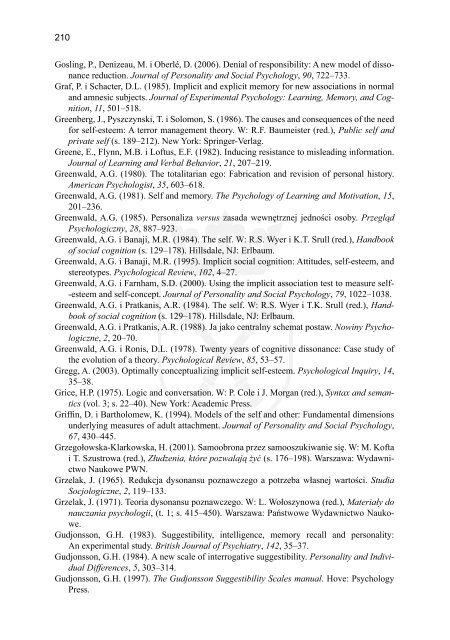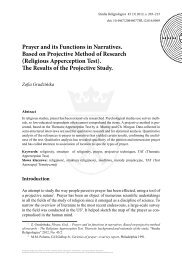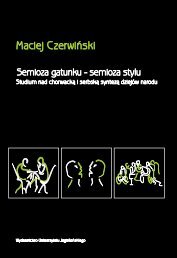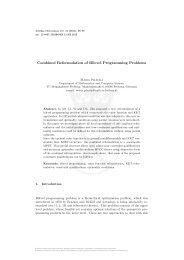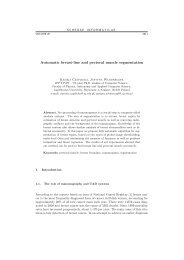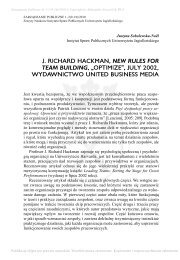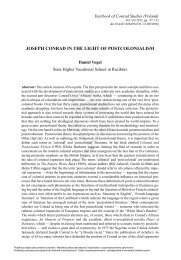szpitalak 2obr.indd - Wydawnictwo Uniwersytetu JagielloÅskiego
szpitalak 2obr.indd - Wydawnictwo Uniwersytetu JagielloÅskiego
szpitalak 2obr.indd - Wydawnictwo Uniwersytetu JagielloÅskiego
You also want an ePaper? Increase the reach of your titles
YUMPU automatically turns print PDFs into web optimized ePapers that Google loves.
210<br />
Gosling, P., Denizeau, M. i Oberlé, D. (2006). Denial of responsibility: A new model of dissonance<br />
reduction. Journal of Personality and Social Psychology, 90, 722–733.<br />
Graf, P. i Schacter, D.L. (1985). Implicit and explicit memory for new associations in normal<br />
and amnesic subjects. Journal of Experimental Psychology: Learning, Memory, and Cognition,<br />
11, 501–518.<br />
Greenberg, J., Pyszczynski, T. i Solomon, S. (1986). The causes and consequences of the need<br />
for self-esteem: A terror management theory. W: R.F. Baumeister (red.), Public self and<br />
private self (s. 189–212). New York: Springer-Verlag.<br />
Greene, E., Flynn, M.B. i Loftus, E.F. (1982). Inducing resistance to misleading information.<br />
Journal of Learning and Verbal Behavior, 21, 207–219.<br />
Greenwald, A.G. (1980). The totalitarian ego: Fabrication and revision of personal history.<br />
American Psychologist, 35, 603–618.<br />
Greenwald, A.G. (1981). Self and memory. The Psychology of Learning and Motivation, 15,<br />
201–236.<br />
Greenwald, A.G. (1985). Personaliza versus zasada wewnętrznej jedności osoby. Przegląd<br />
Psychologiczny, 28, 887–923.<br />
Greenwald, A.G. i Banaji, M.R. (1984). The self. W: R.S. Wyer i K.T. Srull (red.), Handbook<br />
of social cognition (s. 129–178). Hillsdale, NJ: Erlbaum.<br />
Greenwald, A.G. i Banaji, M.R. (1995). Implicit social cognition: Attitudes, self-esteem, and<br />
stereotypes. Psychological Review, 102, 4–27.<br />
Greenwald, A.G. i Farnham, S.D. (2000). Using the implicit association test to measure self-<br />
-esteem and self-concept. Journal of Personality and Social Psychology, 79, 1022–1038.<br />
Greenwald, A.G. i Pratkanis, A.R. (1984). The self. W: R.S. Wyer i T.K. Srull (red.), Handbook<br />
of social cognition (s. 129–178). Hillsdale, NJ: Erlbaum.<br />
Greenwald, A.G. i Pratkanis, A.R. (1988). Ja jako centralny schemat postaw. Nowiny Psychologiczne,<br />
2, 20–70.<br />
Greenwald, A.G. i Ronis, D.L. (1978). Twenty years of cognitive dissonance: Case study of<br />
the evolution of a theory. Psychological Review, 85, 53–57.<br />
Gregg, A. (2003). Optimally conceptualizing implicit self-esteem. Psychological Inquiry, 14,<br />
35–38.<br />
Grice, H.P. (1975). Logic and conversation. W: P. Cole i J. Morgan (red.), Syntax and semantics<br />
(vol. 3; s. 22–40). New York: Academic Press.<br />
Griffin, D. i Bartholomew, K. (1994). Models of the self and other: Fundamental dimensions<br />
underlying measures of adult attachment. Journal of Personality and Social Psychology,<br />
67, 430–445.<br />
Grzegołowska-Klarkowska, H. (2001). Samoobrona przez samooszukiwanie się. W: M. Kofta<br />
i T. Szustrowa (red.), Złudzenia, które pozwalają żyć (s. 176–198). Warszawa: <strong>Wydawnictwo</strong><br />
Naukowe PWN.<br />
Grzelak, J. (1965). Redukcja dysonansu poznawczego a potrzeba własnej wartości. Studia<br />
Socjologiczne, 2, 119–133.<br />
Grzelak, J. (1971). Teoria dysonansu poznawczego. W: L. Wołoszynowa (red.), Materiały do<br />
nauczania psychologii, (t. 1; s. 415–450). Warszawa: Państwowe <strong>Wydawnictwo</strong> Naukowe.<br />
Gudjonsson, G.H. (1983). Suggestibility, intelligence, memory recall and personality:<br />
An experimental study. British Journal of Psychiatry, 142, 35–37.<br />
Gudjonsson, G.H. (1984). A new scale of interrogative suggestibility. Personality and Individual<br />
Differences, 5, 303–314.<br />
Gudjonsson, G.H. (1997). The Gudjonsson Suggestibility Scales manual. Hove: Psychology<br />
Press.


